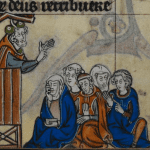All people change. Some change more than others. And that’s okay. Here’s why you should call trans folks by their new names and pronouns.

In my article, “What’s In a Name? Deadnaming, Misgendering & Other Rudeness,” I discuss the importance of calling people by their new names and pronouns. I got some pushback from that article, so I’d like to double down. The Bible offers many examples of people who changed their names, and identities. Christians have no issues referring to them by their new names.
Easy Adjustments for Christians
Here is a list of Bible characters who changed their names. These are the ones that Christians have no difficulty calling by their new names:
- Abram/Abraham. In Genesis 17, God makes a covenant with Abram. God changes the name, which means “exalted father” to “father of a multitude,” because God promises that Abraham will be the father of many nations. Some say that the “H” sound insertion into Abram’s name is God breathing the divine presence into Abraham’s name.
- Sarai/Sarah. Abraham isn’t the only person entering a covenant with God in Genesis 17. After all, Abraham can’t become the father of many nations alone. His wife Sarai, whose name means “princess” also changes her name. “Sarah” has the same meaning. Like her husband, she gets an infusion of divine breath into her name.
- Hoshea/Joshua. In Numbers 13, Most of the spies Moses sends to spy out the Promised Land return with a faithless report. But Caleb remains faithful, along with a comrade named Hoshea, which means “salvation.” Moses changes Hoshea’s name to Joshua, which means “YHWH saves.”
- Simon/Peter. In John 1, Jesus calls Simon the fisherman as his disciple. Jesus looks at his new student and changes his name to the Aramaic name Cephas, which means “rock.” Translated into Greek, we know him better as Peter.
- Hananiah, Mishael and Azariah. From the Book of Daniel, we know these three Hebrews better by their Babylonian names, Shadrach, Meshach, and Abednego. They undergo this name change because of a forced move from Israel to Babylon.
- Saul/Paul. Acts 13 tells us that Saul, the persecutor of Christians, changes his name to Paul when he becomes a propagator of Christianity.
Learning a New Name
Some of these name changes are simple translations, like when my Spanish-speaking friends started calling me “Gregorio,” or its related nickname, “Goyo.” Others involve a change of name within the language native to the speakers. In each case, especially when the new name is a translation, we must understand that the name isn’t translated for the reader’s benefit. The person adjusted to a new name, as did the people around them. Christians generally have no trouble adjusting to the new names of these characters.
Christians tend to accept certain kinds of name changes readily when it comes to the people in their lives. Most have no problem adjusting to a woman changing her title from Miss to Mrs. or changing from her maiden to a married name. They accept it when a person switches from one given name to another, like the way I switched from using my middle name to my first name in fourth grade. Christians also accept titular name changes. They don’t insist on calling Pope Francis by his original name, Jorge Bergoglio. Nor do they insist on referring to England’s King Edward VII as “Bertie.” Though it isn’t easy to learn to call someone by a new name, Christians are ready to do that for someone—if they have the “right” reason.
Tough Adjustments for Christians
Other name changes are tough for Christians. For some reason, we want to keep calling these Bible characters by their old names, even though they exchanged them for a new one.
- Jacob/Israel. God changes the name of Jacob, whose name means “Trickster” or “Supplanter.” After wrestling with God through the night, Jacob earns the new name Israel, which means “One who wrestles with God (Genesis 32).”
- Joseph/Zaphenath-Paneah. Joseph’s brothers sell him into slavery in Egypt. When he rises to prominence, Pharaoh grants him a new Egyptian name (Genesis 41).
- Naomi/Mara. In Ruth 1, we read that, because of her bitter circumstances, Naomi changes her own name, which means “pleasant” to Mara, which means “bitter.”
- Solomon/Jedediah. In 2 Samuel 12, David names his son who will succeed him on the throne Solomon. This name is derived from the Hebrew word for “peace.” But God loves Solomon and sends a message through the prophet Nathan, who renames him Jedediah, which means “Beloved of the Lord.”
- Daniel/Belteshazzar. Along with his friends mentioned above, Daniel’s name gets changed when he experiences forced immigration from Israel to Babylon (See Daniel 1).
This list is not exhaustive. The Bible is full of people changing their names, or having their names changed for them. Christians easily convert from Saul to Paul, or from Simon to Peter. But you rarely hear this second list of people referred to by their new names. Why is this?
Why Should I Change What I Call Them?
For some reason, people never quite adjusted to calling Joseph “Zaphenath-Paneah.” Maybe it was too much of a mouthful. But the reason we fail to recognize a name change usually involves personal preference. We like calling Naomi “Pleasant,” and we don’t understand why anyone would want to be called “Bitter.” While we don’t like tricksters, the thought of someone wrestling with God makes us even more uncomfortable—so we don’t usually call Jacob “Israel.” Because we prefer our comfort over those of the people who bear the names, we stick to our old habits.
But this dishonors our friends who want to change their names. It places us in the driver’s seat and makes them the passengers in their own lives. Instead, we need to get over ourselves and be willing to change. “Why should I change what I call them?” you might ask. Because that’s the Golden Rule. You’d want them to adjust for you—so you ought to adjust for them.
How This Applies to Trans Folks
Transgender people often change their names and their pronouns. This can seem like a lot, if you’ve known somebody by a different name and gender their whole life. But you can change what you call them—there’s even a biblical precedent for that.
Historians tell us it’s likely when Daniel, Hananiah, Mishael, and Azariah immigrated to Babylon, they changed more than just their name. They probably also changed their gender. Even the conservative Got Questions allows for this possibility:
There are certain indicators from Scripture to support the view Daniel was made a eunuch. First, he was never married. Second, as mentioned, he was a slave in a time and place where castration of slaves was common. Third, 2 Kings 20:18 indicates that some of Hezekiah’s descendants would one day be taken from Israel to serve in the palace of the king of Babylon as eunuchs: “And some of your descendants, your own flesh and blood that will be born to you, will be taken away, and they will become eunuchs in the palace of the king of Babylon.” Daniel 1:3 indicates Daniel and his friends were under the authority of the “chief eunuch” (ESV), a man named Ashpenaz. This same verse indicates that these young men were specifically taken in order to serve the king in his palace.
Why would a king have his slaves castrated? Castration was often performed to ensure a king’s advisers did not have children or romantic interests that might tempt them towards betrayal. This procedure was intended to make the subject asexual, disinterested in sex, lacking sexual urges, and unable to produce children.
Got Questions says the Bible is ambiguous on the subject and presents arguments for and against the idea that these four were castrated. Yet, it’s important to note that the likelihood is so high that even this conservative website gives the notion airtime.
Why Does This Matter?
This matters because even the possibility that these biblical heroes changed their names and genders prevents us from reading the Bible in a heteronormative way. We must understand that not everyone in the Bible was cisgender and heterosexual. Gay people exist in the Bible. Queer theologians point out the possibility that David and Jonathan were a couple. They demonstrate the likelihood that the Centurion’s “servant” or “boy” who Jesus healed was actually the man’s lover. And they recognize that in biblical times, eunuchs were considered a gender all their own.
It’s entirely possible that Belteshazzar, Shadrach, Meshach, and Abednego were eunuchs. As such, their name changes also indicated changes in pronouns. Or, at least, a serious re-evaluation of their gender identity. Christians have adjusted to calling three out of four by their new names—so this ought to tell us something. We can make a change in the names and pronouns we use for our trans friends.
Acceptance Saves Lives
Why should you call your trans friend by their new name or pronoun? Here are a few facts to help you understand that acceptance saves lives:
- In Canada, “Lesbian, gay, and bisexual youth are five times more likely to consider suicide, and seven times more likely to attempt suicide.”
- In the US, “The Trevor Project estimates that more than 1.8 million LGBTQ+ young people (ages 13-24) seriously consider suicide each year in the U.S. — and at least one attempts suicide every 45 seconds.”
- According to the Mental Health Foundation, “half of LGBTIQ+ people had experienced depression, and three in five had experienced anxiety.”
- LGBTQIA+ people are more likely to experience hate crimes, domestic violence, and homelessness than other people.
Accepting and affirming LGBTQIA+ people is easy. You can start saving lives by calling someone by their new name. Don’t wait until a loved one has cut you out of their lives completely because you refused to adapt. Don’t wait until they experience serious mental illness because people won’t accept them. And don’t wait until you have to attend their funeral. Acceptance saves lives. This is why you should call your trans friend by their new name and pronoun today.














